|
|
|
Sort Order |
|
|
|
Items / Page
|
|
|
|
|
|
|
| Srl | Item |
| 1 |
ID:
178326
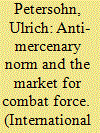

|
|
|
|
|
| Summary/Abstract |
Since 2013, combat services have been increasingly exchanged on the market. This development is puzzling since the practice emerged despite an anti-mercenary norm banning such services, and without any revision of the norm. The article argues that the combat market is not a deliberate design, but the result of strategic interaction. For some, compliance with the anti-mercenary norm is the best strategy, while for others, violating the norm is best. However, once the norm violation occurs, it is in the interest of all actors to maintain a façade of compliance. Non-compliant actors benefit from the combat services, and compliant actors do not have to engage in costly sanctioning of the norm violation, and avoid the reputational costs associated with non-enforcement. The article employs game theory to investigate the strategic interactions of actors across eleven combat contracts from 2013 to 2019.
|
|
|
|
|
|
|
|
|
|
|
|
|
|
|
|
| 2 |
ID:
186331


|
|
|
|
|
| Summary/Abstract |
This article introduces the Commercial Military Actor Database (CMAD), a dataset able to support research on civil war and commercial military actors. First, the CMAD covers all civil wars from 1980 to 2016 across all of the world’s regions except Europe, which enables the investigation of long-term regional and global trends. Second, the CMAD encompasses the corporate market segment and mercenary outfits, which facilitates the analysis of how those actors have impacted conflicts differently. Third, containing detailed information about the relationships behind exchanges, the CMAD allows users to disaggregate market exchanges. Using the CMAD’s new data, we examined trends in the market for force, and demonstrate the data’s added value. We re-examining Akcinaroglu and Radziszewski’s study on how private military and security companies affect the duration of civil war. The findings show that the market’s influence on conflict can only be fully understood by including corporate and mercenary actors.
|
|
|
|
|
|
|
|
|
|
|
|
|
|
|
|
| 3 |
ID:
121816
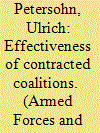

|
|
|
|
|
| Publication |
2013.
|
| Summary/Abstract |
The debate on the effectiveness of Private Security Contractors (PSCs) in Iraq has been waged ever since their first appearance. Statists have argued that they are much less effective than regular troops, while neoliberals consider them an effective supplement to regular troops. However, so far, both schools alike have drawn on anecdotal evidence only; yet, such evidence is prone to a high margin of error and does not allow a comparison of different actors. This article addresses these shortfalls by providing hard data, drawn from the Wikileaks "Iraq War logs" data set, on the conduct of PSCs in Iraq and comparing their performance to that of regular troops, that is, the US and Iraqi armed forces. In general, if PSCs are co-deployed alongside regular troops and oversight is institutionalized, their performance supersedes that of poorly trained military personnel, such as the Iraqi military, and in many cases even that of the highly capable US military.
|
|
|
|
|
|
|
|
|
|
|
|
|
|
|
|
| 4 |
ID:
158115
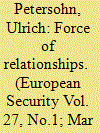

|
|
|
|
|
| Summary/Abstract |
Since the 1990s, military support and security services in hostile environments have been increasingly traded on the market for force. Surprisingly, how exchange is organised on the market for force remains predominantly focused on the neoclassical model, which assumes anonymous exchange, and sellers compete through price and quality of product for customers. However, the model seems to be incomplete as it describes some empirical patterns, yet not others. Why are service backgrounds clustered together and why do specific nationalities dominate the market in the Iraq and Afghanistan war? Why are they not distributed evenly as price and quality competition would suggest? The argument here is that social factors need to be taken in to account, i.e. personal relationships. The logic being that sellers and customers trade through existing relationships, and familiarity is the dealmaker, rather than price. The article takes on the challenge to develop a sociological conceptualisation of the market able to integrate both logics. Finally, the approach is put to the test on the labour market for Western security operators. The results demonstrate that personal relationships play a significant role to explain exchange on the market for force, yet co-existence with the neoclassical logic.
|
|
|
|
|
|
|
|
|
|
|
|
|
|
|
|
| 5 |
ID:
181959
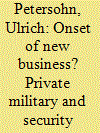

|
|
|
|
|
| Summary/Abstract |
The aim of this investigation is to answer the crucial question of whether private military and security companies (PMSCs) affect conflict onset. It draws on the recently released Private Security Events Database, containing data on PMSC-related events across Latin America, Africa, and Southeast Asia. Employing a Cox Proportional Hazard model, the article explores whether the presence of PMSCs, the duration of PMSC presence, the type of service provided, and the number and type of clients affect conflict onset. Overall, the presence of PMSCs increases the likelihood of conflict onset, although its substantial effect was slight.
|
|
|
|
|
|
|
|
|
|
|
|
|
|
|
|
| 6 |
ID:
107645
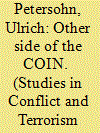

|
|
|
|
|
| Publication |
2011.
|
| Summary/Abstract |
The Iraq War was a watershed regarding the scope of battlefield support by Private Security Companies (PSC). Skeptics soon raised concerns about these new actors being an impediment to the success of the very same operations they are meant to support. According to the critics, PSCs are grist to the mill for insurgents as they employ aggressive tactics and thereby alienate the population, cause credibility problems because they enjoy impunity, and increase coordination problems since they are not subordinated under the military chain of command. This article argues that this is not a necessary result of their employment, but rather the consequence of a lack of preparedness to operate alongside PSCs. However, the military is accustomed to adapting to new unexpected circumstances. Hence, when problems occurred, the armed forces underwent a trial and error learning process that improved PSC employment. The empirical picture supports this view. Initially, the counterinsurgency effort did indeed suffer from the actions, lack of oversight, and lack of coordination of PSCs. However, over the course of the Iraq War, most of the shortfalls were either improved significantly or even resolved.
|
|
|
|
|
|
|
|
|
|
|
|
|
|
|
|
| 7 |
ID:
157684
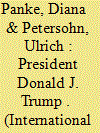

|
|
|
|
|
| Summary/Abstract |
Since his inauguration, US President Donald Trump has made news by violating international and domestic norms, such as norms of diplomatic communication or the non-discrimination norm. This paper uses theoretical approaches to norm eradication in order to examine whether President Trump has turned into an effective agent of norm death leading to the abolition of domestic and international standards of appropriateness. It discusses how the precision of the respective norms, the stability of their contexts, and the actions of norm proponents have played out. This reveals that President Trump’s actions have so far lacked effectiveness, and have not led to norm death. The longevity of challenged norms cannot be taken for granted, however—especially if the challenger is a powerful actor. In order to avoid norm death under this circumstance, it is essential that norm proponents possess capacities and competencies to act, and employ them to defend challenged norms.
|
|
|
|
|
|
|
|
|
|
|
|
|
|
|
|
| 8 |
ID:
136442
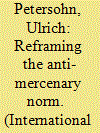

|
|
|
|
|
| Summary/Abstract |
Since the nineteenth century, the anti-mercenary norm has prohibited violent market actors from participating in combat. Today, however, private military and security companies (PMSCs) are widely perceived as legitimate. How did they achieve that legitimacy? This article argues that PMSCs initially resembled mercenaries. Previously, mercenaries were defined as fighters participating in combat for pay, be it offensive or defensive. PMSC advocates aimed to alter the combat component of the anti-mercenary norm. By arguing that PMSCs’ use of force was not combat, but rather individual self-defence, they created an alternative interpretation that established the practice as appropriate. As critical actors like the US, the United Kingdom, and the United Nations adopted their interpretation, the regulatory scope of the norm changed. In short, PMSCs are perceived to be legitimate because they are no longer implicated in the anti-mercenary norm.
|
|
|
|
|
|
|
|
|
|
|
|
|
|
|
|
| 9 |
ID:
139842
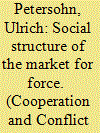

|
|
|
|
|
| Summary/Abstract |
Over the past two decades, governments have increasingly contracted private military and security companies (PMSCs) to support military operations in conflicts. However, many observers have argued that such companies are ‘greedy market actors’ or ‘reckless mercenaries’ and their level of performance very poor. A minority has defended them as security professionals. If market competition is present, the level of performance is high and positive contributions to the client’s military operation can be expected. However, neither PMSC opponents nor proponents can account for the variance in the level of performance in three crucial cases – Sierra Leone, Iraq, and Afghanistan. This article argues that different market structures explain this variance. At least three ideal configurations exist: collaborative, competitive, and rival structures. These structures influence the level of performance. PMSC performance levels are expected to decrease from the first configuration, being positive, to the last, being negative.
|
|
|
|
|
|
|
|
|
|
|
|
|
|
|
|
| 10 |
ID:
100943
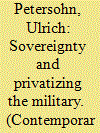

|
|
|
|
|
| Publication |
2010.
|
| Summary/Abstract |
Since the mid-1990s, almost all Western states have privatized military tasks, albeit to varying extents. The article addresses both aspects of the phenomenon: Why did Western states privatize military tasks, and why did they do so to varying extents? The neorealist argument of the market providing a competitive edge for the armed forces and liberalist 'casualty aversion' and 'cost-effectiveness' explanation both equally fail to provide a comprehensive answer for the privatization of military tasks. Alternatively, the article employs sociological institutionalism, arguing that transnational norms on conventional warfare prescribe the structure and organization of armed forces. If the content of these norms changes, states will adjust their force structure accordingly. Consequentially, states started to privatize military tasks when the requirements changed from self-sufficiency to more market reliance. However, transnational norms have to work their way through domestic norms resulting in variations. The more consistent transnational normative demands are with the domestic structure, the more extensive the former demands are implemented. The crucial domestic variable is the notion of sovereignty. If sovereignty is defined minimally market solutions are embraced and military activities are outsourced extensively. If states hold a broader understanding of sovereignty, they are reluctant to hand over military tasks to the market.
|
|
|
|
|
|
|
|
|
|
|
|
|
|
|
|
| 11 |
ID:
193102
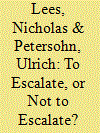

|
|
|
|
|
| Summary/Abstract |
The existing literature is unclear about whether private military and security companies (PMSCs) are a cause of increased conflict severity, or rather are simply hired within more severe conflicts. We argue that PMSCs do increase conflict severity, yet this is the result of an escalation strategy by states to regain territory from rebels. If contracted, PMSCs either substitute for host nation forces, or free up such conventional forces to engage in offensive operations. In both cases the conflict severity increases substantially. This argument is tested with OLS regression using data from 30 weak states from 1990 to 2007.
|
|
|
|
|
|
|
|
|
|
|
|
|
|
|
|
| 12 |
ID:
117917
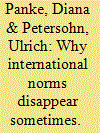

|
|
|
|
|
| Publication |
2012.
|
| Summary/Abstract |
This article addresses the empirical puzzle as to why some formerly deeply embedded international norms either incrementally or rapidly lose their prescriptive status and, in the extreme, can even cease to exist. Why is it that some norms are replaced while others simply disappear? The IR literature has rich explanations for norm creation, diffusion and socialization, yet there is a theoretical and empirical gap on both the dynamics and scope conditions for the degeneration of international norms. Thus, we develop hypotheses on processes and outcomes of norm disappearances that are tested with a series of qualitative studies. Norm degenerations require the presence of actors who challenge the norm and the absence of central enforcement authorities or individual states that are willing and capable of punishing norm violations. Moreover, our study shows that norms are likely to be abolished swiftly if the environment is unstable and rapidly changing and if norms are highly precise. In contrast, norms are likely to become incrementally degenerated if the environment is relatively stable and if norms are imprecise. Both processes lead to norm substitutions, provided that competing norms are present. If rival norms are absent, norms simply disappear without being replaced.
|
|
|
|
|
|
|
|
|
|
|
|
|
|
|
|
|
|
|
|
|